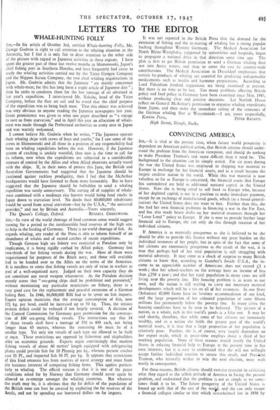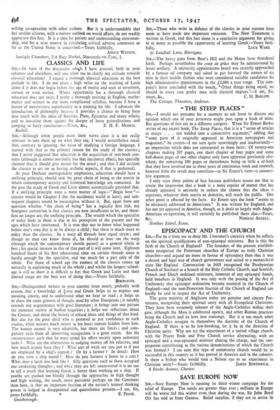CONVINCING AMERICA
SIR,—It is vital at the present time, when future world prosperity is dependent on American political action, that British citizens should under- stand the problem from the American viewpoint, and should do nothing to make President Truman's task more difficult than it need be. The background to the situation can be simply stated. For six years during the war the United States was employed in shipping war material to Europe in exchange for her financial assets, and as a result became the largest creditor nation in the world. While this war material is now valueless so far as Europe is concerned, the financial assets that Europe has surrendered are held as additional national capital in the United States. Now she is being asked to sell food to Europe who, because of her depleted capital, is not in a position to make immediate payment, except by an exchange of manufactured goods, which (as a broad general- isation) the United States does not want to buy. Further than this, she has had her own financial problems in financing a war in the Far East, and has also made heavy drafts on her material resources through her "Lease Lend" policy to Europe. If she is now to provide further large financial aid to Europe, she can only do this through taxation of her individual citizens.
If America is as materially prosperous as she is believed to be she should be able to provide this finance without any great burden on the individual resources of her people, but in spite of the fact that some of her citizens are enormously prosperous as the result of the war, it is true that perhaps half of her total population is still struggling with material adversity. It may come as a shock of surprise to many British citizens to know that, according to Gunther's Inside U.S.A., the in- come to an appreciable number of Americans does not exceed £1 a week ; that her school-teachers on the average have an income of less than £250 a year ; and that her rural population in many cases are still living near the poverty line. Her housing problem is as acute as our own, and the nation is still waiting to carry out necessary material developments which will be a tax on all of her resources. In one State (Arkansas) 42,000 farms have no lavatory accommodation of any kind, and the large proportion of her coloured population of some fifteen millions live permanently below the poverty line. In many cities the housing conditions have to be seen to be believed. The picture of a nation, as a whole, rich in this world's goods is a false one. It may be said shortly, therefore, that while some of her citizens arc immensely wealthy, and as a nation she holds the greater part of the world's material assets, it is true that a large proportion of her population is relatively poor. Further, she is, of course, very largely dependent on her export trade, which in peace-time employs about a third of her working population. None of these reasons would justify the United States in refusing financial help to Europe at the present time in her own interests, but it is easy to understand that she will not willingly accept further individual taxation to secure this result, and Presialent Truman, who naturally wishes to win the next election, must walk warily in consequence.
For these reasons, British citizens should exercise restraint in criticising what they regard as the selfish attitude of America in facing the present problem, and understand that the problem is not as simple as we some- times think it to be. The future prosperity of the United States is bound up with that of the rest of the workl, and she can only escape a financial collapse similar to that which overwhelmed her in 1930 by
willing co-operation with other nations. But it is understandable that her smaller citizens, with a narrow outlook on world affairs, do not readily appreciate this fact. It is a time for patient and understanding statesman- ship, and for a wise reserve in circulating critical adverse comments so far as the United States is concerned.—Yours faithfully, ANGUS WATSON.
Sunlight Chambers, 2-4 Bigg Market, Newcastle-on-Tyne, 1.



































 Previous page
Previous page